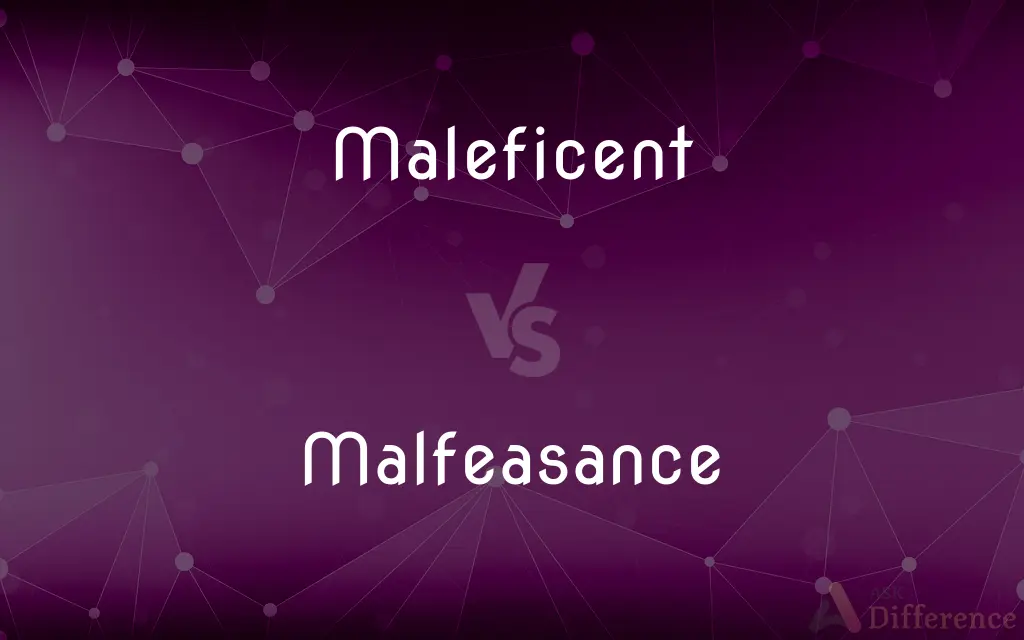Maleficent vs. Malfeasance — What's the Difference?
By Tayyaba Rehman — Updated on October 30, 2023
Maleficent means doing evil or harm. Malfeasance refers to wrongdoing, especially by a public official.

Difference Between Maleficent and Malfeasance
Table of Contents
ADVERTISEMENT
Key Differences
Maleficent characterizes someone or something that causes harm or evil through their actions or presence. Malfeasance is a specific term used to describe an act of illegal or dishonest conduct, especially by a public official.
While maleficent is often used in a broader, more general sense of wickedness or harm, malfeasance has a legal and official context, implying a breach of trust or duty. Maleficent could describe a character in a story, while malfeasance would describe a politician’s actions.
Maleficent has connotations of dark, supernatural elements or malevolent intentions, resonating with its usage in literature and popular culture. In contrast, malfeasance carries a tone of corruption and professional misconduct, frequently cited in legal discussions and news reports.
The term maleficent might be used to describe an act intended to cause misfortune or injury. On the other hand, malfeasance refers specifically to the commission of an act that is unlawful or contrary to official obligation.
Maleficent is an adjective describing the nature of a person or act. Malfeasance is a noun describing a type of action, often requiring proof and legal proceedings to establish its occurrence.
ADVERTISEMENT
Comparison Chart
Definition
Doing evil or harm; harmfully malicious
Wrongdoing or misconduct, especially by a public official
Part of Speech
Adjective
Noun
Usage
General, literary, or descriptive
Legal, official, or professional contexts
Connotation
Evil, harmful, possibly supernatural
Illegal, corrupt, involving breach of trust
Required Context
Can describe abstract concepts or characters
Typically involves specific actions or behaviors
Compare with Definitions
Maleficent
Showing ill will or spite.
His maleficent glare made everyone uneasy.
Malfeasance
Wrongful conduct by a public official.
The senator denied any malfeasance during his term.
Maleficent
Doing harm or evil.
The maleficent sorcerer cast a curse on the village.
Malfeasance
The performance of a public official of an act that is legally unjustified.
The mayor was removed from office for malfeasance.
Maleficent
Having a harmful influence.
The maleficent effects of pollution are alarming.
Malfeasance
An act of willful and intentional misconduct.
The investigation revealed malfeasance in the city council.
Maleficent
Evil in nature or effect.
Maleficent forces were at play in the eerie forest.
Malfeasance
Dishonest or illegal behavior by someone in a position of authority.
The company's CEO was accused of financial malfeasance.
Maleficent
Characterized by malicious intent.
A maleficent plot was uncovered by the detectives.
Malfeasance
A wrongdoing or misconduct, especially by a public official.
Allegations of malfeasance led to a government inquiry.
Maleficent
Maleficent ( or ) is a fictional character who appears in Walt Disney Productions' 16th animated feature film, Sleeping Beauty (1959). She is represented as an evil fairy and the self-proclaimed "Mistress of All Evil" who, after not being invited to a christening, curses the infant Princess Aurora to "prick her finger on the spindle of a spinning wheel and die" before the sun sets on Aurora's sixteenth birthday.Maleficent is based on the evil fairy godmother character in Charles Perrault's fairy tale Sleeping Beauty, as well as the villainess who appears in the Brothers Grimm's retelling of the story, Little Briar Rose.
Malfeasance
Misconduct or wrongdoing, especially by a public official.
Maleficent
Causing harm or destruction, especially by supernatural means
He did not act with any maleficent motivation
A maleficent deity
Malfeasance
Wrongdoing.
Maleficent
Harmful or malicious in intent or effect.
Malfeasance
(legal) Misconduct or wrongdoing, especially by a public official and causing damage.
Maleficent
Harmful or evil in intent or effect.
Malfeasance
The doing of an act which a person ought not to do; evil conduct; an illegal deed.
Maleficent
Doing evil to others; harmful; mischievous.
Malfeasance
Wrongful conduct by a public official
Maleficent
Harmful or evil in intent or effect
Common Curiosities
Can a company be maleficent?
Yes, if it intentionally causes harm, it can be described as maleficent.
Is maleficent always intentional?
Yes, maleficent actions are typically deliberate with the intent to cause harm.
What constitutes malfeasance?
Malfeasance involves an act of intentional or negligent wrongdoing, especially by a public official.
How is malfeasance proven?
Through legal proceedings that demonstrate intentional wrongdoing.
What does maleficent mean?
Maleficent means causing harm or intended to do evil.
Are there degrees of maleficent behavior?
Maleficent behavior can vary in severity but always involves harmful intent.
Can malfeasance be committed by anyone?
No, malfeasance typically refers to misconduct by a public official or someone in a position of authority.
Can natural events be described as maleficent?
Typically not, as maleficent implies intention, which natural events lack.
Who investigates malfeasance?
Usually, government regulatory bodies or law enforcement agencies.
Is there a positive use for maleficent?
No, maleficent is inherently negative with a harmful connotation.
Do maleficent and malfeasance have the same origin?
No, maleficent comes from Latin 'maleficus' meaning 'wicked', while malfeasance from Anglo-French 'malfaisance' meaning 'wrongdoing'.
Is malfeasance a crime?
Yes, it can be a criminal offense, depending on the nature of the act.
Can maleficent be used in a legal context?
Rarely, as it's more literary or descriptive than technical.
Are malfeasance and corruption the same?
Malfeasance is a form of corruption but specifically involves the breach of official duty.
Can malfeasance result in dismissal?
Yes, it can lead to dismissal from a position, fines, or even imprisonment.
Share Your Discovery

Previous Comparison
Apogee vs. Nadir
Next Comparison
Laborer vs. WorkerAuthor Spotlight
Written by
Tayyaba RehmanTayyaba Rehman is a distinguished writer, currently serving as a primary contributor to askdifference.com. As a researcher in semantics and etymology, Tayyaba's passion for the complexity of languages and their distinctions has found a perfect home on the platform. Tayyaba delves into the intricacies of language, distinguishing between commonly confused words and phrases, thereby providing clarity for readers worldwide.
















































